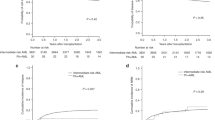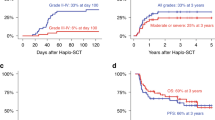Abstract
The utility of imatinib in either the pre- or post-transplant period for Ph chromosome-positive (Ph+) ALL is uncertain. In addition, there have been recent concerns regarding imatinib and cardiac toxicity. We investigated the outcome of 32 patients with Ph+ ALL who received an allo-hematopoietic cell transplant (HCT) at the University of Minnesota between 1999 and 2006. The median age at HCT was 21.9 years (range: 2.8–55.2). All patients were conditioned with CY and TBI. GVHD prophylaxis was CsA based. Of the 32 patients, 15 received imatinib therapy pre- or post-HCT (imatinib group) and 17 patients received either no imatinib (n=11) or only after relapse (n=6) (non-imatinib group). Overall survival, relapse-free survival and relapse at 2 years was 61, 67 and 13% for the imatinib group as compared with 41, 35 and 35% for the non-imatinib group (P=0.19, 0.12 and 0.20, respectively). Cardiac toxicity and TRM at 2 years were similar between groups. Thus, patients treated with imatinib in either the pre- or post-transplant setting had trends toward improved outcomes and no increase in cardiac toxicity. We suggest that imatinib be included in the peri-transplant management of all patients with Ph+ ALL.
This is a preview of subscription content, access via your institution
Access options
Subscribe to this journal
Receive 12 print issues and online access
$259.00 per year
only $21.58 per issue
Buy this article
- Purchase on Springer Link
- Instant access to full article PDF
Prices may be subject to local taxes which are calculated during checkout



Similar content being viewed by others
References
Pui CH, Evans WE . Treatment of acute lymphoblastic leukemia. N Engl J Med 2006; 354: 166–178.
Pui CH, Evans WE . Acute lymphoblastic leukemia. N Engl J Med 1998; 339: 605–615.
Arico M, Valsecchi MG, Camitta B, Schrappe M, Chessells J, Baruchel A et al. Outcome of treatment in children with Philadelphia chromosome-positive acute lymphoblastic leukemia. N Engl J Med 2000; 342: 998–1006.
Sharathkumar A, Saunders EF, Dror Y, Grant R, Greenberg M, Weitzman S et al. Allogeneic bone marrow transplantation vs chemotherapy for children with Philadelphia chromosome-positive acute lymphoblastic leukemia. Bone Marrow Transplant 2004; 33: 39–45.
Snyder DS, Nademanee AP, O'Donnell MR, Parker PM, Stein AS, Margolin K et al. Long-term follow-up of 23 patients with Philadelphia chromosome-positive acute lymphoblastic leukemia treated with allogeneic bone marrow transplant in first complete remission. Leukemia 1999; 13: 2053–2058.
Barrett AJ, Horowitz MM, Ash RC, Atkinson K, Gale RP, Goldman JM et al. Bone marrow transplantation for Philadelphia chromosome-positive acute lymphoblastic leukemia. Blood 1992; 79: 3067–3070.
Chao NJ, Blume KG, Forman SJ, Snyder DS . Long-term follow-up of allogeneic bone marrow recipients for Philadelphia chromosome-positive acute lymphoblastic leukemia. Blood 1995; 85: 3353–3354.
Lee S, Kim YJ, Min CK, Kim HJ, Eom KS, Kim DW et al. The effect of first-line imatinib interim therapy on the outcome of allogeneic stem cell transplantation in adults with newly diagnosed Philadelphia chromosome-positive acute lymphoblastic leukemia. Blood 2005; 105: 3449–3457.
de Labarthe A, Rousselot P, Huguet-Rigal F, Delabesse E, Witz F, Maury S et al. Imatinib combined with induction or consolidation chemotherapy in patients with de novo Philadelphia chromosome-positive acute lymphoblastic leukemia: results of the GRAAPH-2003 study. Blood 2007; 109: 1408–1413.
Yanada M, Takeuchi J, Sugiura I, Akiyama H, Usui N, Yagasaki F et al. High complete remission rate and promising outcome by combination of imatinib and chemotherapy for newly diagnosed BCR-ABL-positive acute lymphoblastic leukemia: a phase II study by the Japan Adult Leukemia Study Group. J Clin Oncol 2006; 24: 460–466.
Fielding AK, Richards SM, Lazarus HM, Litzow MR, Luger SM, Marks DI et al. Does imatinib change the outcome in Philadelphia chromosome positive acute lymphoblastic leukaemia in adults? Data from the UKALLXII/ECOG 2993 study. Blood 2007; 110: 8.
Carpenter PA, Snyder DS, Flowers ME, Sanders JE, Gooley TA, Martin PJ et al. Prophylactic administration of imatinib after hematopoietic cell transplantation for high-risk Philadelphia chromosome-positive leukemia. Blood 2007; 109: 2791–2793.
Sohn SK, Kim JG, Kim DH, Lee KB . Cardiac morbidity in advanced chronic myelogenous leukaemia patients treated by successive allogeneic stem cell transplantation with busulphan/cyclophosphamide conditioning after imatinib mesylate administration. Br J Haematol 2003; 121: 469–472.
Sawyers CL, Hochhaus A, Feldman E, Goldman JM, Miller CB, Ottmann OG et al. Imatinib induces hematologic and cytogenetic responses in patients with chronic myelogenous leukemia in myeloid blast crisis: results of a phase II study. Blood 2002; 99: 3530–3539.
Kerkela R, Grazette L, Yacobi R, Iliescu C, Patten R, Beahm C et al. Cardiotoxicity of the cancer therapeutic agent imatinib mesylate. Nat Med 2006; 12: 908–916.
Ribeiro RC, Broniscer A, Rivera GK, Hancock ML, Raimondi SC, Sandlund JT et al. Philadelphia chromosome-positive acute lymphoblastic leukemia in children: durable responses to chemotherapy associated with low initial white blood cell counts. Leukemia 1997; 11: 1493–1496.
Fletcher JA, Lynch EA, Kimball VM, Donnelly M, Tantravahi R, Sallan SE . Translocation (9;22) is associated with extremely poor prognosis in intensively treated children with acute lymphoblastic leukemia. Blood 1991; 77: 435–439.
Uckun FM, Nachman JB, Sather HN, Sensel MG, Kraft P, Steinherz PG et al. Clinical significance of Philadelphia chromosome positive pediatric acute lymphoblastic leukemia in the context of contemporary intensive therapies: a report from the Children's Cancer Group. Cancer 1998; 83: 2030–2039.
Linker CA, Levitt LJ, O'Donnell M, Forman SJ, Ries CA . Treatment of adult acute lymphoblastic leukemia with intensive cyclical chemotherapy: a follow-up report. Blood 1991; 78: 2814–2822.
Deininger M, Schleuning M, Greinix H, Sayer HG, Fischer T, Martinez J et al. The effect of prior exposure to imatinib on transplant-related mortality. Haematologica 2006; 91: 452–459.
Shimoni A, Kroger N, Zander AR, Rowe JM, Hardan I, Avigdor A et al. Imatinib mesylate (STI571) in preparation for allogeneic hematopoietic stem cell transplantation and donor lymphocyte infusions in patients with Philadelphia-positive acute leukemias. Leukemia 2003; 17: 290–297.
Champlin RE, Schmitz N, Horowitz MM, Chapuis B, Chopra R, Cornelissen JJ et al. Blood stem cells compared with bone marrow as a source of hematopoietic cells for allogeneic transplantation. Blood 2000; 95: 3702–3709.
Garderet L, Labopin M, Gorin NC, Polge E, Fouillard L, Ehninger GE et al. Patients with acute lymphoblastic leukaemia allografted with a matched unrelated donor may have a lower survival with a peripheral blood stem cell graft compared to bone marrow. Bone Marrow Transplant 2003; 31: 23–29.
Schultz KR, Bowman WP, Slayton W, Aledo A, Devidas M, Sather H et al. Improved early event free survival (EFS) in children with Philadelphia chromosome-positive (Ph+) acute lymphoblastic leukemia (ALL) with intensive imatinib in combination with high dose chemotherapy: Children's Oncology Group (COG) Study AALL0031. Blood 2007; 110: 4.
Goulden N, Bader P, Van Der Velden V, Moppett J, Schilham M, Masden HO et al. Minimal residual disease prior to stem cell transplant for childhood acute lymphoblastic leukaemia. Br J Haematol 2003; 122: 24–29.
Sramkova L, Muzikova K, Fronkova E, Krejci O, Sedlacek P, Formankova R et al. Detectable minimal residual disease before allogeneic hematopoietic stem cell transplantation predicts extremely poor prognosis in children with acute lymphoblastic leukemia. Pediatr Blood Cancer 2007; 48: 93–100.
Miglino M, Berisso G, Grasso R, Canepa L, Clavio M, Pierri I et al. Allogeneic bone marrow transplantation (BMT) for adults with acute lymphoblastic leukemia (ALL): predictive role of minimal residual disease monitoring on relapse. Bone Marrow Transplant 2002; 30: 579–585.
Eapen M, Rubinstein P, Zhang MJ, Stevens C, Kurtzberg J, Scaradavou A et al. Outcomes of transplantation of unrelated donor umbilical cord blood and bone marrow in children with acute leukaemia: a comparison study. Lancet 2007; 369: 1947–1954.
Fischer T, Reifenrath C, Hess GR, Corsetti MT, Kreil S, Beck J et al. Safety and efficacy of STI-571 (imatinib mesylate) in patients with bcr/abl-positive chronic myelogenous leukemia (CML) after autologous peripheral blood stem cell transplantation (PBSCT). Leukemia 2002; 16: 1220–1228.
Atallah E, Durand JB, Kantarjian H, Cortes J . Congestive heart failure is a rare event in patients receiving imatinib therapy. Blood 2007; 110: 1233–1237.
Murdych T, Weisdorf DJ . Serious cardiac complications during bone marrow transplantation at the University of Minnesota, 1977–1997. Bone Marrow Transplant 2001; 28: 283–287.
Acknowledgements
This work was supported by the Children's Cancer Research.
Author information
Authors and Affiliations
Corresponding author
Rights and permissions
About this article
Cite this article
Burke, M., Trotz, B., Luo, X. et al. Allo-hematopoietic cell transplantation for Ph chromosome-positive ALL: impact of imatinib on relapse and survival. Bone Marrow Transplant 43, 107–113 (2009). https://doi.org/10.1038/bmt.2008.296
Received:
Revised:
Accepted:
Published:
Issue Date:
DOI: https://doi.org/10.1038/bmt.2008.296
Keywords
This article is cited by
-
Final analysis of the JALSG Ph+ALL202 study: tyrosine kinase inhibitor-combined chemotherapy for Ph+ALL
Annals of Hematology (2018)
-
Impact of MRD and TKI on allogeneic hematopoietic cell transplantation for Ph+ALL: a study from the adult ALL WG of the JSHCT
Bone Marrow Transplantation (2016)
-
Tyrosine kinase inhibitors in Ph+ acute lymphoblastic leukaemia: facts and perspectives
Annals of Hematology (2016)
-
Favorable outcome of haploidentical hematopoietic stem cell transplantation in Philadelphia chromosome-positive acute lymphoblastic leukemia: a multicenter study in Southwest China
Journal of Hematology & Oncology (2015)
-
Myeloablative unrelated cord blood transplantation for Philadelphia chromosome-positive acute lymphoblastic leukemia: comparison with other graft sources from related and unrelated donors
Annals of Hematology (2015)



